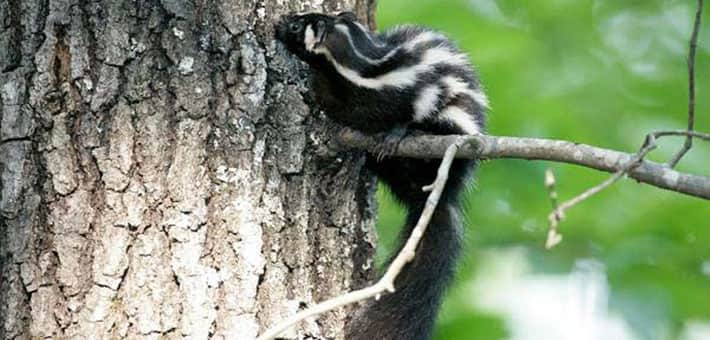U.S. Fish and Wildlife Service to Review Rare Fox and Skunk Protection Status
OutdoorHub 12.06.12

The prairie gray fox and plains spotted skunk, two subspecies found in grasslands of some Midwestern and Great Plains states, may warrant federal protection as a threatened or endangered species, the U.S. Fish and Wildlife Service announced today, following an initial review of a petition seeking to protect the two species under the Endangered Species Act.
The Service will undertake a more thorough status review of the species to determine whether to propose adding the species to the federal lists of endangered and threatened wildlife and plants. The Service found that information in the petition to list the Mearn’s eastern cottontail was not substantial.
Today’s announcement, known as a 90-day finding, is based on scientific information about the species provided in the petition. The 90-day finding does not mean that the Service has decided it is appropriate to give the prairie gray fox and plains spotted skunk federal protection under the ESA. Rather, this finding triggers a more thorough status review of all the biological information available.
Based on the status review, the Service will make one of three possible determinations:
- Protection under the ESA is not warranted, in which case no further action will be taken.
- Protection under the ESA as threatened or endangered is warranted. In this case, the Service will publish a proposal to list, solicit independent scientific peer review of the proposal, seek input from the public, and consider the input before a final decision about listing the species is made. In general, there is a one-year period between the time a species is proposed and the final decision.
- Protection under the ESA is warranted but precluded by other, higher priority activities. This means the species is added to the federal list of candidate species, and the proposal to list is deferred while the Service works on listing proposals for other species that are at greater risk. A warranted but precluded finding requires subsequent annual reviews of the finding until such time as either a listing proposal is published, or a not warranted finding is made based on new information.
The Endangered Species Act makes it illegal to kill, harm or otherwise “take” a listed species, or to possess, import, export or engage in interstate or international commerce of a listed species without authorization in the form of a permit from the Service. The Act also requires all federal agencies to minimize the impact of their activities on listed species, and directs the Service to work with federal agencies and other partners to develop and carry out recovery efforts for those species. Listing also focuses attention on the needs of the species, encouraging conservation efforts by other agencies (federal, state and local), conservation groups and other organizations and individuals.
To ensure the status reviews of the plains spotted skunk and prairie gray fox are comprehensive, the Service is soliciting information from state and federal natural resource agencies and all interested parties regarding the animals and their habitat.
You may submit information on the prairie gray fox and the plains spotted skunk, by one of the following methods:
- Electronically: Go to the Federal eRulemaking Portal: http://www.regulations.gov. Search for Docket No. FWS–R3–ES–2012–0079, which is the docket number for this action. Then click on the Search button. You may submit a comment by clicking on “Comment Now!”
- By hard copy: Submit by U.S. mail or hand-delivery to: Public Comments Processing, Attn: FWS–R3–ES–2012–0079; Division of Policy and Directives Management; U.S. Fish and Wildlife Service; 4401 N. Fairfax Drive, MS 2042–PDM; Arlington, VA 22203.
The deadline to submit comments electronically to the Federal eRulemaking Portal is February 4, 2012). After that date, comments must be mailed to the address above. We will not accept e-mail or faxes.
For more information on the two subspecies and this finding, please visit www.fws.gov/midwest/endangered

